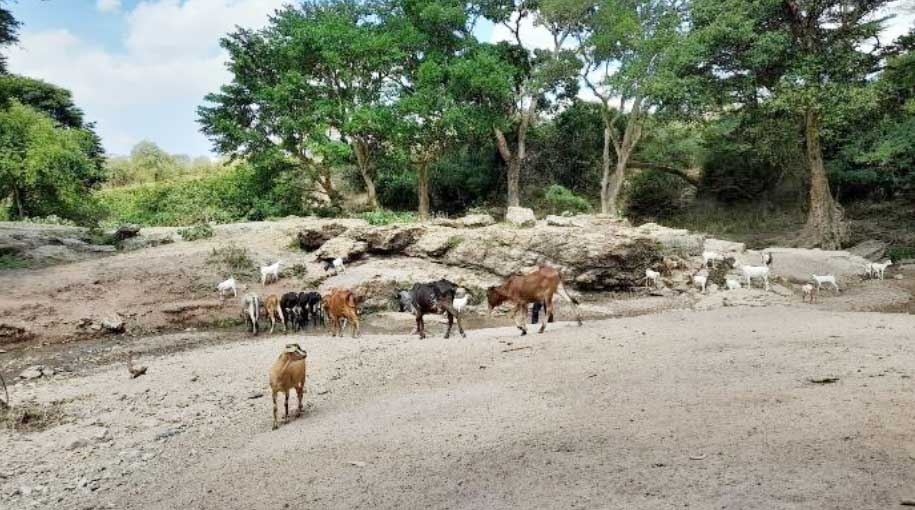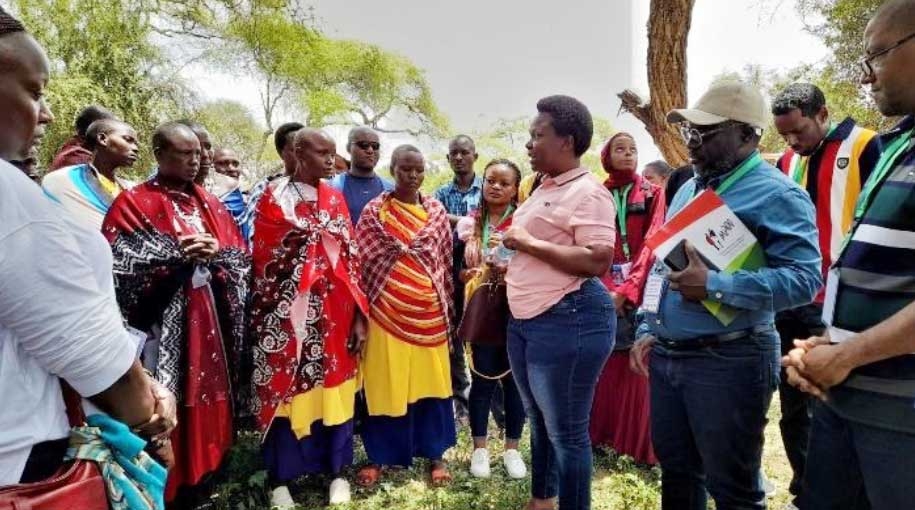Baguio City, Philippines, May 2023—Twenty-two emerging leaders of indigenous peoples in Africa participated in the African Regional Training on Indigenous Peoples’ Self-Determined and Sustainable Development last February 27 to March 2 in Arusha, Tanzania. The training aimed to strengthen the integrated and holistic approach to sustainable development of indigenous peoples in the different regions of Africa.
Anne Samante, Finance and Administrative Manager of MPIDO, emphasized in her opening statement that the issues of indigenous peoples in Africa are cross-cutting and development initiatives to address these are supposed to be “our” way of indigenous peoples. “We need development in our way, not imposed by the government,” she said.
The training served as a venue for the participants to discuss the prevailing global crises that are affecting their communities including poverty, climate change, biodiversity erosion, land grabbing, conflict and discrimination, among others. Esperance Binyuki Nyota, the executive director of Union pour l’Emancipation de la Femme Autochtone (UEFA) based in the Democratic Republic of Congo and one of the training facilitators, stressed that indigenous peoples must not be ignored considering their important roles in responding to these crises.
The human rights of indigenous peoples as embodied in the United Nations Declaration on the Rights of Indigenous Peoples (UNDRIP) were also comprehensively discussed. The participants surfaced the different human rights violations being experienced by indigenous peoples in Africa.
The participants highlighted the different challenges being confronted by indigenous women in Africa, their causes and consequences. They emphasized how indigenous women and indigenous children are affected by natural and man-made disasters, on the drought in East Africa, armed conflict in Cameroon and the Democratic Republic of Congo as well as the displacement in Ngorongoro in Tanzania.
This writer, the training coordinator of the Elatia Indigenous Peoples Training Institute, provided an overview of the General Recommendation No. 39 on the rights of indigenous women and girls of the Committee on the Elimination of all forms of Discrimination against Women (CEDAW). Adopted last October 2022, General Recommendation No. 39 is a guide to States parties on legislative, policy and other relevant measures to ensure the implementation of their obligations in relation to the rights of indigenous women and girls under the CEDAW.
“Young indigenous children cannot speak their mother tongue. If we lose language, we lose traditional knowledge,” Shamazi Maendeleo Edouard Dewar of Dignité Pygmée (DIPY) in the Democratic Republic of Congo stressed, emphasizing the parallel need to preserve indigenous knowledge and indigenous language. Likewise, participants shared the different challenges they are facing in protecting their traditional knowledge.
The partners also highlighted the challenges and threats to their traditional livelihoods and stressed the significant differences between the prevailing dominant economic systems and the indigenous and local economic systems. In conclusion, Bouba Njobdi Amadou of Lelewal and one of the training facilitators pointed out that indigenous economies are intergenerational and are done in consideration of the seen and the unseen.
Furthermore, the participants shared their perspectives about what is ‘being happy’ to them or how they define wellbeing. “It means a good life, especially [for our] community. For pastoralists, it is more livestock, more healthy people with education,” said Edward Gafachu of PAICODEO and PINGO’s Forum in Tanzania. For Chia Onorine Nyabong of Lelewal, wellbeing meant being able “to create joy and peace to other people and the prevalence of self-control”.
As part of the training, the participants visited the Maasai community in Terat village of Simanjiro district in the Arusha Region of Tanzania to enrich their understanding on the significant roles of traditional knowledge on natural resource management.
Loorimpa Mazingira, a community-organized group at Terrat village, revived and conserved their dried-up river using their traditional knowledge and with the support of PINGO’s Forum, a non-government organization (NGO) based in Arusha. Now, Loorimpa River provides them water for cleaning and cooking and for drinking of their livestock, as well as ensures water supply for the next generations.

The participants also visited the African Court on Human and Peoples’ Rights based at the Mwalimu Julius Nyerere Conservation Centre in Arusha. Personnel of the Court’s Registrar provided an overview of the mission of the Court, its jurisdiction, the Judges as well as of opportunities for engagement of indigenous peoples in the Court, among others. During the interactive discussion, the ELATIA partners were able to raise significant questions and concerns on the situation of indigenous peoples in Africa.
The resource persons and participants of the event belong to ELATIA partner organizations in Africa. ELATIA is a global partnership of indigenous peoples’ organizations, networks and NGOS in 13 countries from Asia, Latin America and Africa that are spearheading self-determined and sustainable development of indigenous peoples.
Mainyoito Pastoralists Integrated Development Organization (MPIDO) based in Nairobi, Kenya organized the five-day training in close coordination with Tebtebba and the Elatia Indigenous Peoples Training Institute which are based in Baguio City, Philippines.


